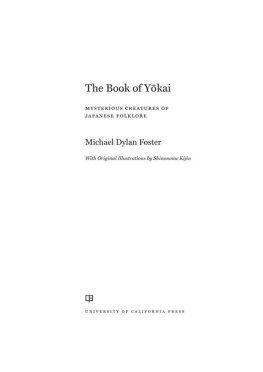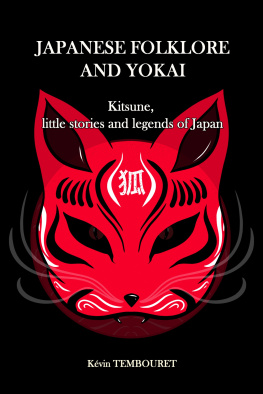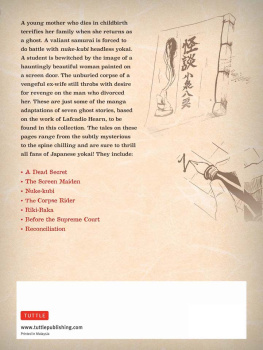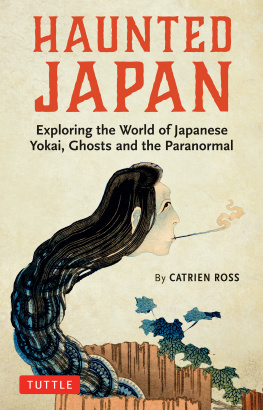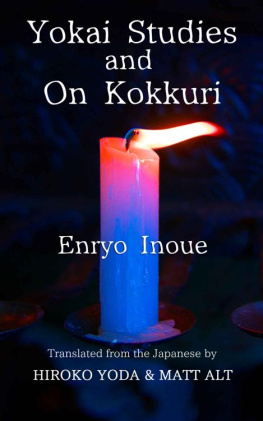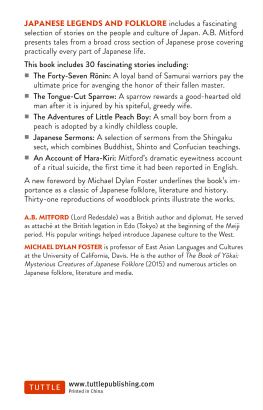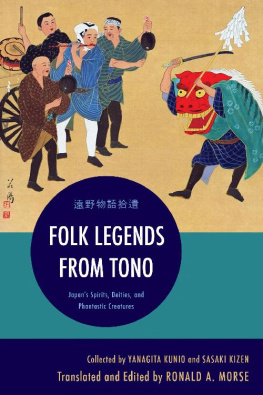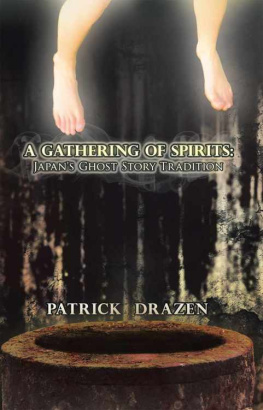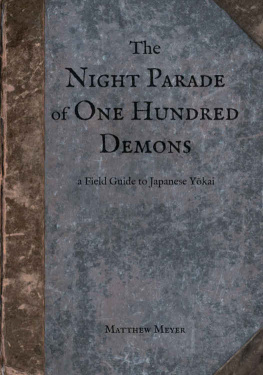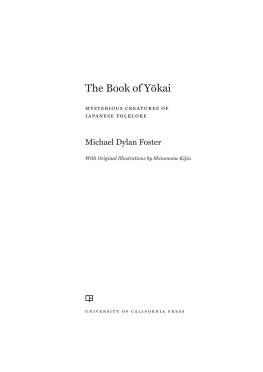Water Goblin Tales
PREFACE AND ACKNOWLEDGMENTS
Long ago, there was a kappa. A water goblin. It was about two inches tall, green, made of some sort of durable ceramic material, and it sat atop the small refrigerator in my studio apartment in California. It was just an inexpensive charm from a shrine that somebody must have given to me when I lived in Japan for the first time. Or perhaps I bought it myself. Either way, I had never actually given it much thought. But then one day, I was opening the refrigerator to get a beer and, for some reason, the kappa caught my attention. I began to inspect it carefully, turning it over in my hands. What was a kappa anyway? I knew that it was a little monster from Japanese folklore, a nasty, threatening creature that pulled people and animals into the water. But that didnt really explain anything. The little goblin was inviting me on a quest to explore an otherworld of fantastic beings and to try to understand how this otherworld might also be part of our own world.
I was in graduate school at the time, in Asian studies, and I ended up writing my masters thesis about kappa. I wasnt able to answer all the questions the creature raised, but I did learn that in Japan such water
The creature on my refrigerator guided me into the otherworld of ykai, and I have been exploring it ever since. I went on to write a doctoral dissertation on ykai, and in 2009 I published a book called Pandemonium and Parade: Japanese Monsters and the Culture of Ykai, which is a cultural history of discourses of the weird and mysterious over the last four hundred years.
The Book of Ykai is a very different endeavor. Although it builds on what I learned while working on Pandemonium and Parade and in the years since its publication, the present book focuses more explicitly on ykai as forms of folkloric expression and communication that are simultaneously part of long-standing historical traditions and also very much alive and changing today. It also travels further back, into the earliest known texts in Japanese history, exploring a range of ideas and discussing some key individuals, from Abe no Seimei to Lafcadio Hearn, who contributed in different ways to shaping understandings of the supernatural world. The Book of Ykai also introduces many of the ykai themselvessome already famous beyond Japanese shores, and others almost unknown outside the small villages in which their legends developed.
Ykai are part of folklore and popular culture in Japan, of course, but in recent years they have also started to garner attention elsewhere, including North America and Europe. In large part because of manga, anime, gaming, and the global influence of Japans soft power, more and more people have heard of ykai and are interested in their folkloric roots. Although The Book of Ykai does not focus explicitly on contemporary popular culture and media, I hope it will be useful to people engaged in these dimensions, as well as to anybody interested more generally in questions of belief, the monstrous, and the uncanny.
I wrote The Book of Ykai while living in two very different locations in Japan: the city of Kyoto and the island of Shimo-Koshikijima in Kagoshima Prefecture. Kyoto, of course, is a historic capital and was a center of elite power and cultural production for much of Japanese history. In contrast, the island of Shimo-Koshikijima, with fewer than three thousand people, is far removed from the historical seats of power and, for that matter, from many of the amenities of urban life today. Yet both these places are entirely fitting locations to contemplate ykai, because ykai are equally at home in the metropolitan centers of the nation and in its rural peripheries. And in both places, my thinking about this project benefited immensely from conversations with friends and colleagues and teachersthough, of course, responsibility for any mistakes is entirely my own.
Kyoto is the home of the International Research Center for Japanese Studies (Nichibunken), a research facility that houses one of the largest collections of material on ykai in the world; the current director, Komatsu Kazuhiko, has been the leading academic researcher on ykai for the last several decades. I finished drafting this book while in residence there in 2013 and was fortunate to have access to all these resources, as well as to the wisdom of Komatsu-sensei and the members of his various kenkykai (research workshops). My profound gratitude goes to Komatsu-sensei and to Professor Yamada Shji, who sponsored me while I was there as a visiting research scholar. I am also indebted to Nakano Yhei, Tokunaga Seiko, and the other denizens of the ykai project room, to Egami Toshinori and the Nichibunken library staff, and to Hayashi Hiroko, Nishiyama Akemi, No Sung-hwan, Ted Mack, and Kasumi Yamashita for many hours of excellent company and conversation.
For the first half of 2012, I lived on Shimo-Koshikijima, in the village of Teuchi, in order to research a ritual that I have written about elsewhere. But while on the island, I also began writing this book. A few of the local ykai made it into the pages that follow; but more important, the experience of living in a small rural community gave me a deeper understanding of the kind of village lifestyle that was, and still is, characteristic of many parts of Japan. My friends on the island, many of whom I have known for over a decade, helped me understand viscerally the intimate connection of people with place, and the living relationship between history and the present. I am indebted to too many people to name them individually, but I am especially grateful to Hironiwa Yoshitatsu and Hironiwa Yasuko for many hours of insightful conversation and exquisite food (and imo-jch ). My deep appreciation also goes to my good friend Ozaki Takakazu and his family; to Shirasaki Hiroki, Shirasaki Sugako, Kawabata Tsuyoshi, Kawabata Yoriko, Hironiwa Hirokazu, Hironiwa Masako, Megurida Toshifumi, Megurida Chiriko, Hashiguchi Yoshitami, Hashiguchi Kyoko, Hironiwa Mamoru, Hironiwa Eiko, and their families; and to the fishermen of Aose.

